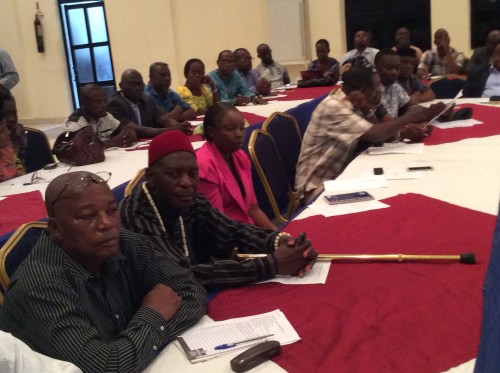The community-based projects (CBR+) component of the Nigeria UN-REDD+ Readiness Programme, among other focal areas, shall design livelihoods initiatives that reduce poverty and support improved forest management. Similarly, the programme shall establish safeguards to ensure that improved livelihoods does no harm to the environment.

This forms one of the numerous resolutions at the second meeting of the Cross River State (CRS) REDD+ Stakeholders’ Forum that held May 7-8, 2015 in Calabar, the CRS capital. The Forum was inaugurated last December as the ultimate platform to coordinate stakeholder participation and contribution to the programme implementation.
REDD, meaning Reducing Emissions from Deforestation and Forest Degradation, implies an effort to create financial value for the carbon stored in forests, offering incentives for developing countries to reduce emissions from forested lands and invest in low-carbon paths to sustainable development.
Participants at the May 2015 REDD+ Forum, which sought to consolidate broad-based stakeholder engagement and contribute to the development of a REDD+ strategy, also agreed that there should be deliberate policy review to address the phenomenal forest policy disconnect between Federal and State Forestry institutions. They identified redefining functions as a critical gap to redress.
“There should be deliberate policy to both reduce and manage the lease of forest land for agricultural expansion. CRS and the REDD+ programme should facilitate a state-wide land use plan and local community land use plans to guide decisions around land use,” the gathering resolved, adding that forest valuation is fundamental to shaping REDD+ implementation, and that such valuation should consider both standing forests and the value of regeneration.
While stressing that stakeholder engagement strategy should strongly consider accountability within stakeholders to enable the supply of and demand for information, the delegated agreed that the REDD+ process should closely engage with stakeholders and develop agreements or relevant documents that clearly protect the rights and access of forest dependent communities to their forests.
The Forum likewise resolved thus:
“REDD+ implementation must develop and enforce strategy to empower forest dependent communities to provide consent freely based on adequate previous information. The FPIC principle should be effectively operated, with the consciousness that consultation should not replace consent.
“The CRS REDD+ Forum considers the CRS REDD+ Technical Committee as the principal medium for the facilitation stakeholders’ technical input in the REDD+ programme. The Technical Committee shall take responsibility for the coordination of all sub-committees in the programme. The Terms of Reference for the Technical Committee as developed will guide their technical contribution to the programme and accountability to stakeholders.
“Part of measures to address the problem of deforestation is capacity building for forest dependent communities to monitor and report forest change.
“The REDD+ programme will apply Knowledge Management as an essential means to share and capture lessons among stakeholders to strengthen capacity and improve knowledge about REDD+.
“REDD+ implementation should enable community organising such that representatives of stakeholders are held accountable and are able to report back to their communities.
“The REDD+ programme should effectively engage with institutional heads and REDD+ desk officers in relevant Government MDAs to ensure information and participation is strengthened.
“The recommendations from the Participatory Government Assessment (PGA) report should guide the development of safeguards that will help improve forest governance in CRS.”
Thematic areas of the CBR+ were listed to include:
- Sustainable Forest Management/Biodiversity conservation;
- Capacity Development to engage in climate change mitigation processes, including REDD+;
- Sustainable Livelihoods; and,
- Renewable Energy.
Hitherto, the Programme, which has CRS as a pilot, recorded achievements such as:
- Finalising Nigeria National CBR+ Plan;
- Producing draft call for concept note;
- Reviewing CRS CBR+ Committee operations and membership; and,
- Developing plan to initiate pilot/demonstration projects.
According to Odigha Odigha, chairman of the Cross River State Forestry Commission (CRSFC), on completion of the Readiness phases, the Investment and Performance phases of the REDD+ process will be implemented.
